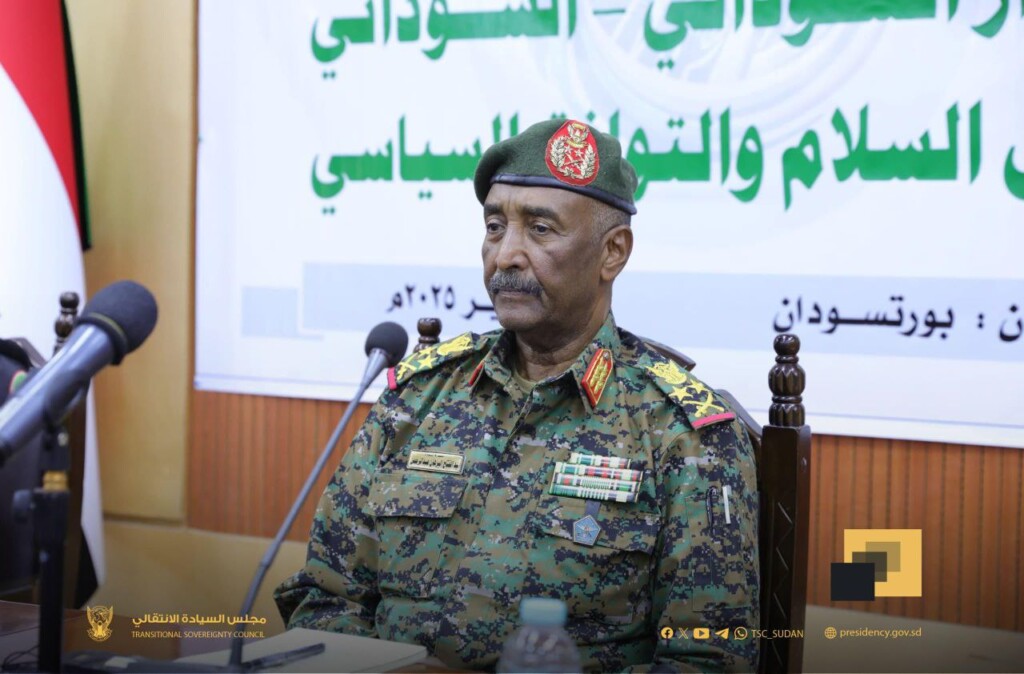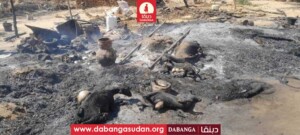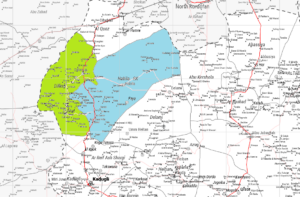El Burhan: ‘NCP and Tagadom will not return to power in Sudan’

Lt Gen Abdelfattah El Burhan, Chairman of the Transitional Sovereignty Council and Commander-in-Chief of the Sudanese Armed Forces, speaks at the close of national dialogue consultations in Port Sudan, February 2025 (File photo: Sudan Transitional Sovereignty Council)
The chairman of Sudan’s Transitional Sovereignty Council, commander-in-chief of the Sudanese Armed Forces (SAF) and de facto leader of the ruling junta, Lt Gen Abdelfattah El Burhan, has courted sharp criticism from across the political spectrum, after cautioning members of the dissolved Islamist National Congress Party (NCP), which ruled Sudan under the deposed Omar Al Bashir regime, as well as the pro-democracy Tagadom coalition, that they “will not return to power in Sudan”. El Burhan asserts that both groups “supported those who kill the Sudanese, and you and they are the same.” He also ruled out any negotiation between the government at the Rapid Support Forces (RSF).
Speaking at the conclusion of the consultations of the national and social political forces on the roadmap for the Sudanese-Sudanese dialogue in Port Sudan yesterday, El Burhan said that “if the NCP* wants to rule, it will have to compete in the future with the rest of the political forces… there is no second chance to judge the will of the Sudanese at this stage, otherwise there will be no difference between you, the Forces for Freedom and Change (FFC) or Tagadom**.”
El Burhan explained that “the door is still open to anyone who takes a patriotic stance and withdraws his support for the RSF… My message to the FFC and Tagadom is that like the NCP, you will not return to power. You supported those who kill the Sudanese, and you and they are the same.”
El Burhan called on the NCP to “stay away from political outbidding”, and he also accused the coordination of Tagadom for “supporting the RSF”.
Formation of a government
El Burhan stressed that the coming period will witness the formation of an independent government of national competencies to complete the transitional tasks. He said that the next government could be called a caretaker government or a war government.
He said that after the necessary amendments to, and approval of the Constitutional Charter, a prime minister will be chosen to carry out his duties in managing the executive apparatus of the state without any interference.
El Burhan pointed out that they are close to completing the necessary amendments to the Constitutional Charter, and points contained in this document, which he received today from the political and societal forces, will be included.
He stressed the need to take into account his recommendations and the outcomes of the dialogue that took place to complete the transitional period, and that these forces will be an integral part of what will be achieved in terms of complete victory in all of Sudan. “We want this dialogue to be comprehensive for all political and societal forces.”
‘No negotiation with RSF‘
Regarding negotiations with the RSF, El Burhan closed the door to any negotiations, and made that conditional on those he called the rebels laying down their weapons and leaving the homes of citizens and civilian dignitaries, and ending the siege on El Fasher.
He added: “Some have offered us a ceasefire during Ramadan in order to facilitate the delivery of aid to El Fasher,” but we stressed that we will not accept a ceasefire in light of the siege imposed by the RSF on the city.
He said the ceasefire should be followed by a withdrawal from Khartoum, West Kordofan and Darfur states and the assembly of forces in specific centres.
NCP
Following El Burhan’s comments, a number of leaders of the dissolved NCP issued a statement seen by Radio Dabanga: “We reject El Burhan’s attack on the NCP at every opportunity, in order to get closer to and curry Favor with weak and crumbling forces,” they say, referring to the coordination of Tagadom and the FFC.
The statement added, “We believe that it is too early to pay attention to the dispute and discord and to search for political gains that will inevitably harm the battle.”
The statement added: “After the war, no one will confiscate our will… and are welcome to the ballot boxes.”
Ahmed Haroun, the delegated head of the NCP, who is wanted by the International Criminal Court, said that “our homeland is more important than partisan interests.”
Haroun pledged not to return to power “except through the free electoral mandate of the people”.
NCP leader Hamid Mamtaz, considered El Burhan’s approach to Tagadom as “flirting with a partner who betrayed the homeland and formed an alliance against its stability”.
Mamtaz also accuses El Burhan of “an attempt to exonerate his former partners,” and called on El Burhan “not to listen to deceivers and those jockeying for position”.
‘Unjustified’
Another NCP leader, Hajj Majid Suwar, says that “the blood that was shed will not be a sacrifice for the return of Abdallah Hamdok and his group [Tagadom] to the scene again, no matter the price, as we will not lose more than what we have already lost,” and called El Burhan’s attack on the NCP “unjustified at this critical time and circumstance”.
In his own reaction, NCP leader Amin Hasan Omar said: “I agree with El Burhan if what he meant was that the former NCP men will not return to power and should not return. However, if he meant the idea of the NCP as a whole, then he is wrong. The people will be the judge.”
‘Agitation’
In another reaction, Khaled Omar Yousef, a leader in the coordination committee of Tagadom, said that the state of agitation that gripped the elements of the former regime [NCP] following El Burhan’s speech “clearly reveals the truth of this war and its goals”.
In a post on X, Yousef says: “It is a war through which the NCP and its Islamist movement seek to climb on its shoulders to completely dominate power.”
He pointed out that several contradictory statements were issued by the dissolved NCP, and its leaders. “Some of them attacked El Burhan, and others sought to appease him tactically… their only motive is power; and as soon as E; Burhan’s statements touched them, they rose up, revealing without ambiguity the truth of this war and its goals.”
He stressed that the relationship between the Islamist movement and the armed forces depends on its ability to subjugate the military establishment to serve its partisan agenda. He said that the Islamic movement’s approach and methods are based on profiting from war speeches.
Sharif Osman, the political secretary of the Sudanese Congress Party (SCP), said in press statements that El Burhan’s attack on the Islamists and his assertion that they will not rule Sudan is “a clear message to hold them [the Islamists] responsible for the war”.
Conciliatory language
Reacting to a directive by El Burhan to Sudanese consulates and embassies abroad not to issue passports to Sudanese citizens, Mohamed Bashir Abunmo, a leader in the Sudan Liberation Movement led by Minni Minawi (SLM-MM), suggested that El Burhan’s speech “contained more conciliatory language than required towards the FFC and Tagadom”. Posting on X, Abunmo said: “What we understand is that whoever declares repentance, and opposition to the RSF, will not prevented from returning to Sudan, but his participation in power is subject to a popular mandate, just like the NCP.”
JEM
Suleiman Sandal, head of the Justice and Equality Movement (JEM), considered El Burhan’s talk about the NCP not returning to power an attempt to throw dust in the eyes of the Sudanese people, adding: “Everyone knows that they do not need to return to it, because they have already returned and are now in all the joints of the state.”
He added that the army was kidnapped by the NCP and that El Burhan, in his statements, distributed amnesty and forgiveness certificates to the members of (Progress) and threatened to continue the war.
He said that the Port Sudan group is made up of the NCP and its affiliated Islamic Movement after the October 25 coup. Sandal confirmed their intention to form what he called the revolutionary government to work on stopping the war and completing the tasks of the glorious December Revolution.
NUP: ‘El Burhan is a liar’
Salah Manaa, a leader in the National Umma Party (NUP), described El Burhan as “a liar”, accused him of “dispersing the sit-in despite his absolute commitment to protect it”. Manaa adds: “El Burhan swore to protect the transitional period, but he turned against it on October 25. He denied his relationship with Ali Karti and the NCP, so he ignited the April 15 war with them in order to bring them back to the scene.” He considered El Burhan’s statements “a ruse” directed at the countries of the region, all in order for him to continue in power.
SPLM-N
Yassir Arman, Secretary General of the Sudan People’s Liberation Movement – North (SPLM-N) asked that El Burhan’s speech be read as a movement “away from bitterness and zero-sum positions”.
In a statement on X platform, Arman suggests that “the importance of this speech comes from its transition from one of absolute victory to one of political talk that leads to the search for solutions, “which opens a window of light for dialogue and the raising of actual and complex questions”.
He said that whatever the results of the army’s current victories, they are stepping stones towards a peaceful solution, not absolute victory. “Winning the war through a decisive military victory is not possible,” Arman says.
Arman called on the army “to translate its progress on the battlefield into progress on the political field, as there is no absolute victory.” He called on El Burhan to meet with all the FFC inside and outside Sudan to discuss stopping and ending the war without conditions or stipulations.
* The National Congress Party (NCP), established in 1998 by key political figures in the National Islamic Front, dominated politics in Sudan for more than 10 years. It was chaired by President Omar Al Bashir – who was ousted in April 2019, during the December 2018 Revolution. The NCP was dissolved in November 2019.
** Tagadom – The Coordination of the Civil Democratic Forces alliance, better known by its Arabic name Tagadom (meaning ‘progress’), was founded in the Ethiopian capital of Addis Ababa in October 2023, by members of the mainstream Forces for Freedom and Change (FFC-Central Council) and other Sudanese pro-democracy parties and groups. Former PM Abdalla Hamdok was elected chair. The Arab Socialist Ba’ath Party and the Communist Party of Sudan are not part of the alliance.
Tagadom aims to build the “broadest democratic civil front possible” against the war between the Sudan Armed Forces (SAF) and the paramilitary Rapid Support Forces (RSF) that erupted in April that year. In December, Tagadom invited the commanders of the warring parties to discuss its roadmap to peace with them. RSF Commander Mohamed ‘Hemedti’ Dagalo responded to the call and signed the Addis Ababa Declaration with Tagadom on January 2.
The SAF did not respond, but instead accused the alliance of siding with its enemy. In early April, the Sudanese Committee for RSF War Crimes and Violations in Port Sudan filed criminal charges against 17 Tagadom leaders (Abdalla Hamdok, Omer El Degeir, Khaled Yousef, Maryam, Zeinab, and Siddig El Sadig, El Wasig El Bereir, Rasha Awad, Maher Abujookh, Shawgi Abdelazim, Babakr Feisal, Taha Ishag, Mohamed El Faki, Yassir Arman, Suliman Sandal, Jaafar Hasan, and Mohamed Osman), a move that was expected by many.











 and then
and then